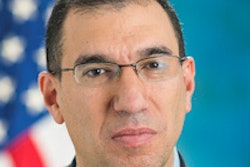
Though existing meaningful use regulations still remain in effect, the U.S. government plans to propose new regulations in the spring that will detail how the electronic health record (EHR) incentive program will transition to align with recent initiatives promoting value-based care.
After remarking in a speech last week at the J.P. Morgan Healthcare Conference that the meaningful use program "was effectively over," U.S. Centers for Medicare and Medicaid Services (CMS) Acting Administrator Andy Slavitt elaborated on the program's future in a joint January 19 blog post with Dr. Karen DeSalvo from the Office of the National Coordinator for Health IT (ONC).
While praising the achievements of the meaningful use program to date, Slavitt and DeSalvo acknowledged that "it also created real concerns about placing too much of a burden on physicians and pulling their time away from caring for patients."
At the same time, the Obama administration and Congress have recently implemented patient-centered initiatives focusing on the value and quality of care. The Obama administration aims to link quality metrics to 30% of Medicare payments in 2016 and 50% of Medicare payments in 2018, while Congress last year passed the Medicare Access and CHIP Reauthorization Act of 2015 (MACRA). That bill considers quality, cost, and clinical practice improvement activities in determining Medicare physician payments.
"While MACRA also continues to require that physicians be measured on their meaningful use of certified EHR technology for purposes of determining their Medicare payments, it provides a significant opportunity to transition the Medicare EHR Incentive Program for physicians toward the reality of where we want to go next," they wrote.
Proposed regulations will be released in the spring and will follow four principles, according to Slavitt and DeSalvo:
- Reward providers for the positive outcomes that technology helps them achieve with their patients.
- Allow providers the flexibility to customize health IT to the needs of their individual practices. Technology must be user-centered and support physicians.
- Level the technology playing field to promote innovation, including for start-ups and new entrants, by unlocking electronic health information through open application programming interfaces (APIs) -- technology tools that underpin many consumer applications. This way, new apps, analytic tools, and plug-ins can be easily connected so that data can be securely accessed and directed where and when it is needed to support patient care.
- Prioritize interoperability by implementing federally recognized, national interoperability standards and focusing on real-world uses of technology, such as ensuring continuity of care during referrals or finding ways for patients to engage in their own care
Slavitt and DeSalvo noted that physicians and other clinicians will need to keep in mind a number of issues as CMS and ONC work to transition from the staged meaningful use phase to how the new program will look under MACRA. For example, the current law requires that CMS and ONC continue to measure the meaningful use of ONC-certified health information technology under the existing set of standards.
"While MACRA provides an opportunity to adjust payment incentives associated with EHR incentives in concert with the principles we outlined here, it does not eliminate it, nor will it instantly eliminate all the tensions of the current system," they wrote. "But we will continue to listen and learn and make improvements based on what happens on the front line."
In addition, they pointed out that MACRA only addresses Medicare physician and clinician payment adjustments; the EHR inventive programs for Medicare and Medicaid hospitals have a different set of statutory requirements. However, CMS and ONC will continue to explore ways to align with the specified principles as much as possible for hospitals and the Medicaid program, Slavitt and DeSalvo wrote.
They also emphasized that the new approach to meaningful use under MACRA won't happen overnight.
"Our goal in communicating our principles now is to give everyone time to plan for what's next and to continue to give us input," they wrote. "We encourage you to look for the MACRA regulations this year; in the meantime, our existing regulations -- including meaningful use stage 3 -- are still in effect."
Slavitt and DeSalvo also said they would release guidance soon on the new process for granting hardship exemptions under the meaningful use program.
As with any change, the challenge is moving from principles to reality. The transition of the meaningful use program will be an ongoing process that will be most successful when physicians and innovators can collaborate to create the best tools to care for patients, according to Slavitt and DeSalvo.
"We look forward to working collaboratively with stakeholders on advancing this change in the months ahead," they wrote.




















